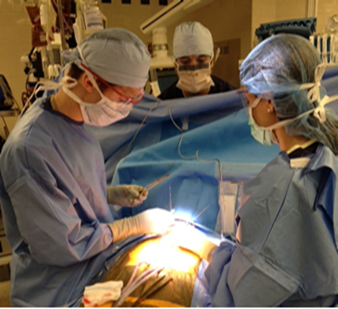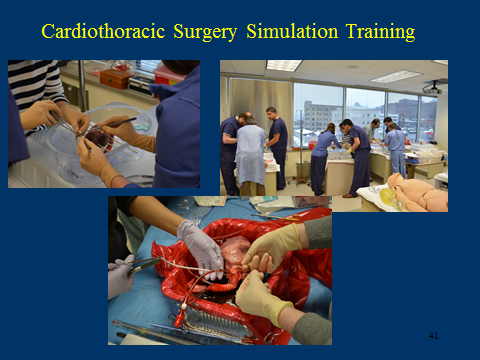ALERT!
This site is not optimized for Internet Explorer 8 (or older).
Please upgrade to a newer version of Internet Explorer or use an alternate browser such as Chrome or Firefox.
University of Pittsburgh Medical Center

University of Pittsburgh Medical Center
UPMC Presbyterian
Suite C800
200 Lothrop Street
Pittsburgh, PA 15213
Christine Regan Carey, Program Coordinator
James D. Luketich, MD
Program Director
Chief of Thoracic Division
Thomas Gleason, MD
Chief of Cardiac Division
Victor O. Morell, MD
Chief of Congenital Division
Program Information
- Traditional and integrated training options available
- Four residents accepted per year to the traditional (two-year) program
- Two residents accepted per year to the integrated (six-year) program
Additional Curriculum Information
The 6-year integrated Cardiothoracic Surgery (CT) Residency Program, with residents entering directly from medical school provides focused training in CT surgery as well as the fields closely allied with CT surgery for a focused, in-depth, interdisciplinary approach to cardiac and thoracic disease. 1-2 years of academic enrichment either through laboratory or clinical research opportunities or to pursue graduate degree in a related or ancillary field is optional. The integrated program includes both a cardiovascular surgery track and a general thoracic surgery track resident that provides focused training for the resident. The curriculum of the integrated pathway includes rotations in core surgical education, as well as specialties closely related to CT surgery, including rotations in general surgery, interventional cardiology, interventional radiology, vascular surgery, pediatric cardiology, heart failure, surgical oncology, pulmonology, anesthesia, as well as adult cardiac and general thoracic surgery in order to provide focused, in-depth, and interdisciplinary exposure to CT surgery. The CT Surgery and General Surgery Program Directors work closely to provide the best educational and operative experience for the CT Integrated Residents. A more directly focused and more comprehensive curriculum in CT surgery, in a shorter time frame provides the trainee, at an earlier stage in their training, with the specific skills they will utilize throughout their career in CT surgery.
Cardiothoracic surgery residents complete a two-year training program with two residents per year in the cardiac stream and two residents per year in the thoracic stream. During the two-year program the cardiac stream residents complete 16 adult cardiac rotations, two pediatric cardiac, eight general thoracic rotations . During the two-year program the thoracic stream residents complete 18 general thoracic rotations; seven adult cardiac rotations and one pediatric cardiac rotation. During this training there is exposure to multi-vessel revascularizations, combinations of the valve repairs and replacements, congenital heart disease and acquired pediatric heart disease procedures, endoscopic techniques, including rigid bronchoscopy, flexible bronchoscopy and fluorescence bronchoscopy with associate advanced laser techniques and complex endoscopic cases for a wide variety of malignant and benign esophageal disorders. Residents may choose an elective month on cardiopulmonary transplant where they will have exposure to single lung, double lung, heart/lung and heart transplantation and the techniques of mechanical circulatory support, including left and biventricular assist devices. The residents are encouraged to participate in basic science and clinical research projects with the goal of submitting one to two paper(s) each year.




